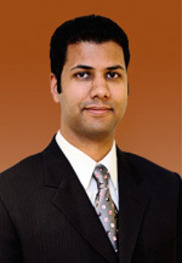Yoosuf Picard, Ph.D.
Associate Research Professor of Materials Science and Engineering
Professor Yoosuf N. Picard is an Associate Research Professor of Materials Science and Engineering at Carnegie Mellon University. He obtained his B.S. in Mechanical Engineering from Louisiana Tech University in 2001, and subsequently his Ph.D. in Materials Science and Engineering from the University of Michigan in 2006.
While pursuing his undergraduate degree in mechanical engineering, he learned in a materials science course that atoms arranged themselves in highly ordered arrays. He found the geometry of these arrangements very intriguing and later realized that materials science was in fact his favorite class in his undergraduate curriculum. As a junior, he interned at Sandia National Laboratories for a Material Scientist. He found research to be an exciting experience and the materials science projects he worked on solidified his desire to make the switch to materials science. Therefore, he decided to pursue his Ph.D.
Professor Picard’s original plan when he started college was to work in industry. Nevertheless, he saw his later decision to obtain a Ph.D. as a fundamental change in his goals, but one that simply requires adaption and willingness to take a chance. His first teaching experience was as a teaching assistant for a materials characterization course that included electron microscopy at the University of Michigan. During his post-doctoral degree work, he specialized in electron microscopy – a field where you actually get to directly see how the atoms arrange themselves at the atomic level.
Since joining CMU as a faculty member, Professor Picard has been the primary instructor for Introduction to Materials Characterization, a core class for sophomores in Materials Science and Engineering, which teaches students about characterization and electron microscopy of materials. His research work at CMU also lies primarily in electron microscopy, where he advises Ph.D. students and Master’s students. Professor Picard also advises undergraduate students on research projects. If there was one major quality that Professor Picard recognizes as having improved over his years at CMU, it is his ability to listen. He finds that different people communicate in very different ways, and being an effective adviser and listener requires actively appreciating not only what people say, but how and why they are saying it.
In the Energy Science Technology and Policy (EST&P) program, he serves as the professor for the core course entitled Energy Conversion and Supply. In his view, technological advances and societal improvement ultimately revolve around the question of how to maintain our standard of living with a growing population and diminishing resources. As there is no one solution, the answer is going to require improved scientific solutions and engineering technology from many different areas. Since the ESTP program has a strong affiliation within the Materials Science Department, Professor Picard saw it as an opportunity to be involved in addressing this major issue, focusing specifically on energy resource usage and energy conversion technologies. Inevitably, his research in Material Science also has a role in improving energy utilization and energy efficiency. Currently, his research group studies manufacturing processes with better energy efficiency and novel influences on metal microstructures, defect dynamics for lower power memory storage and more efficient photovoltaics, and microstructural influences on basic properties critical to improved efficiency in fuel cells.
Professor Picard’s Energy Conversion and Supply course is a topical course that is not only required to be fundamental but also must cover many cutting-edge technologies utilized in the energy sector. Since what we know about energy changes with time, the coursework also changes from year to year. Furthermore, while most students come in with very specific backgrounds in one energy sector, no one is an expert in all the sectors; his teaching philosophy is to incorporate an active learning process through the course rather than a textbook approach of assignments and exams. Therefore, through this course, Professor Picard’s goal is to help the students anticipate what they are required to review on their own, which may be thermodynamics or other such topics, and then teach them the basic workings of systems that supply, distribute and utilize energy. His hope is that everyone learns something new, even if it is fundamental in nature.
While not a history buff, Professor Picard is interested in the idea of developing a course on the History of Science and Engineering, which could be an elective course for any majors. He explains that one example subject in the course would cover flight, starting with basic motion and flow, Bernoulli’s principle, and iterative engineering by the likes of Leonardo da Vinci, Jean-Pierre Blanchard, and the Wright Brothers that lead to powered flight. Another example topic would cover the history of iron and steel making. That would involve teaching students about how various cultures explored and developed processes to extract, alloys, heat and mechanically work iron into a useful metal. This process spans many centuries and varied based on geography and other environmental factors, but started with the simple making of tools and weapons to the eventual building of complex structures and engines that laid the groundwork for the industrial revolution. He believes that these stories are truly global in nature since no culture or country achieved these major engineering feats on their own, but was a result of careful documentation, experimentation and collaboration spanning centuries. He believes the course to be significant as there appears to be a basic lack of understanding and appreciation by many in the public regarding the way science has evolved over time and its impact on our quality of life. Since he finds that people respond well to stories and narratives, he envisions teaching the class as a series of narratives and biographies across cultures and civilizations, where the story of flight or steel is presented as a series of tribes, empires or individuals trying something new and passing what they learned on to others.
His favorite aspect of CMU remains the students, who he believes are of high quality and caliber, which makes challenging them an enjoyable experience both for him and for the students. His advice to ESTP students is to actively identify and pursue opportunities at CMU (inside and outside the classroom) that will develop skills and provide experience that directly improves their employability. This means that aside from having a high GPA, their resume should reflect diversity as well as leadership and communication experience, which is desirable in addition to analytical and critical thinking skills associated with engineering. During his studies, he himself was involved in student government, was a student leader for a religious organization and treasurer for an international student association despite not being an international student himself.
Professor Yoosuf Picard currently lives in Pittsburgh with his wife, who is faculty at the University of Pittsburgh in Bioengineering. He has previously lived in Washington D.C., Michigan and Louisiana, and loves the food in the South. His activities outside of CMU involve annual obstacle course racing, which requires him to train throughout the year. He considers communication skills to be a student’s biggest asset and always encourages his students to try something new.
Interviewd by: Saakshi Gupta ('15)

